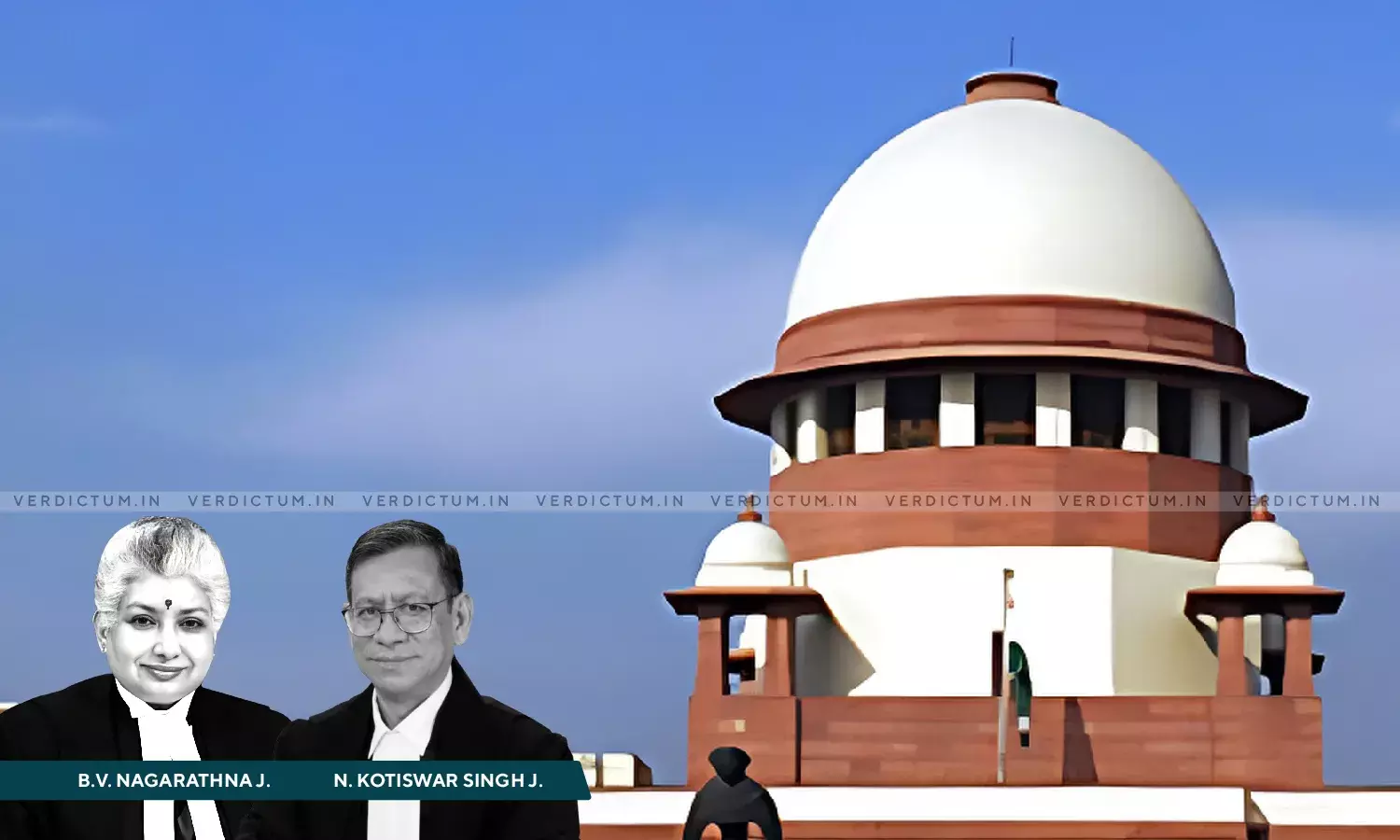Opinion Of Experts However Weighty They May Be, Are Not Binding On The Court: Supreme Court
The Supreme Court observed that where the expert opinion suffers from certain shortcomings or ambiguities, lack of clarity, or inadequacy, it would be subject to judicial scrutiny.

The Supreme Court in its recent Judgment, has observed that the opinion of experts under Section 45 of the Indian Evidence Act, 1872 (IEA), however weighty they may be, are not binding on the Court.
The Court observed thus in a batch of Civil Appeals in which the issue was whether the imported goods are to be treated as Base Oil as claimed or High-Speed Diesel (HSD) as determined by the Customs Authorities.
The two-Judge Bench of Justice B.V. Nagarathna and Justice N. Kotiswar Singh held, “The opinion of the experts, however weighty they may be, are not binding on the court and is only relevant for the court to consider it to come to a final decision on any fact in issue. However, since courts are not experts in the discipline of science, they ordinarily accept the scientific report and act upon it. But where the expert opinion suffers from certain shortcomings or ambiguities, lack of clarity, or inadequacy, it would be subject to judicial scrutiny and it would not be safe to rely wholly on the same under such circumstances.”
Senior Advocate Arvind P. Datar represented the Appellants while ASG N. Venkataraman represented the Respondents.
In this case, the Appellants imported goods from UAE, declaring them as "Base Oil". However, the Directorate of Revenue Intelligence (DRI) seized the cargo, classifying it as High-Speed Diesel (HSD), a prohibited import. Multiple lab tests confirmed the HSD classification. The Appellants contested the findings, but the High Court ultimately allowed the Department's Appeals, leading to the Appellants approaching the Apex Court.
Reasoning
The Supreme Court in view of the facts and circumstances of the case, said, “… neither the expert nor the test results categorically and in clearly terms mention that these samples are that of HSD, except for making an ambiguous remark that these samples conform to certain parameters of HSD as per IS 1460:2005. As discussed above, by mere conformation to certain parameters of HSD, the samples cannot be equated with HSD. The expert opinion and the test results are as vague as these can be qua classification of the oil as HSD.”
The Court was of the opinion that there may be varying range in the degree of probabilities and where the proceedings involve requirement of fulfilment of technical/scientific parameters with confiscatory and penal consequences, the degree of probability would be of a higher order and not mere probability.
“The real test for classification, according to us, would be as to whether any goods or substance in question is “most akin” or bears the closest resemblance or similarity to any of the specified goods mentioned under the Headings and relative Section or Chapter Notes under the Tariff Act, and not by applying the test of preponderance of probability”, it further noted.
The Court said that the definitive opinion and finding that the imported goods are “most akin” to HSD is missing in the reports and opinion for classifying the imported goods as HSD.
“The oil in question does not fully satisfy the specifications of HSD in terms of IS 1460:2005. Hence, the correct test will be whether the oil/article in issue is most akin to HSD or not for which appropriate scientific evidence in the form of laboratory test reports and opinion of the scientific experts will be of utmost relevance”, it added.
The Court also observed that it would be more appropriate to give the benefit of doubt to the Appellants because of the inconclusive evidence, rather than directing for a fresh testing and seeking fresh expert opinion, as a one-time measure.
“In the present case, the evidence/materials on which the High Court based its conclusion are the test reports and the evidence of the expert, Dr. Gobind Singh. Since the test reports are not conclusive as regards all the 21 stipulated parameters under IS 1460:2005 and the evidence of Dr. Gobind Singh is also not definitive, the test report and expert opinion would be required to be assessed properly”, it said.
The Court, therefore, directed the Respondents to ensure that proper facilities are made available in the appropriate laboratories for undertaking tests for all these parameters or at least for those parameters which the Authorities consider are of essential character to satisfy the “most akin” test without which the article in issue cannot be properly classified.
Accordingly, the Apex Court allowed the Appeals, set aside the impugned Judgment, and directed the authorities to take necessary steps within six months for proper testing in all the parameters in future.
Cause Title- Gastrade International v. Commissioner of Customs, Kandla (Neutral Citation: 2025 INSC 411)
Appearance:
Appellants: Senior Advocate Arvind P. Datar, AOR Rajesh Kumar Gautam, Advocates S. Jaikumar, Kartik Jindal, Anant Gautam, and Aashdeep Kaur.
Respondents: ASG N. Venkataraman, AORs Gurmeet Singh Makker, Mukesh Kumar Maroria, Advocates Rupesh Kumar, Adit Khorana, Aakanksha Kaul, Udai Khanna, and Navanjay Mahapatra.


